Load-shedding could switch South Africans off the ANC
- Published
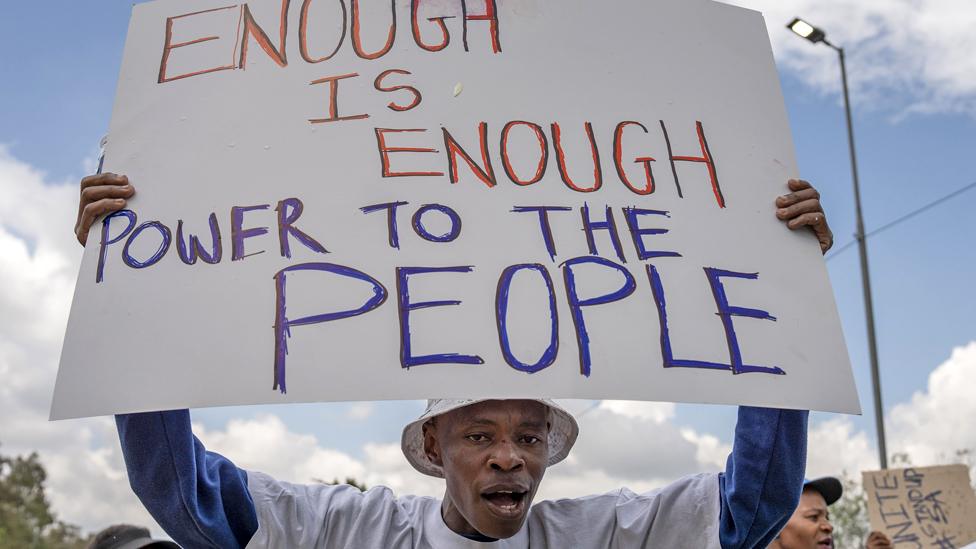
South Africans are experiencing worsening blackouts as winter hits and the crisis is fuelling demands for political change in Africa's most-advanced economy.

Wiseman Bambatha was indulging in wishful thinking when he named his business Goodhope upholstery.
Mr Bambatha re-conditions sofas and chairs in a dingy, one-room workshop in the sprawling Khayelitsha township on the edge of Cape Town.
But for hours on end, his battered, electric sewing machine sits idle. The power is off in Khayelitsha for eight or 10 hours almost every day. In South Africa they call it load-shedding.
Orders are not being met, customers are angry.
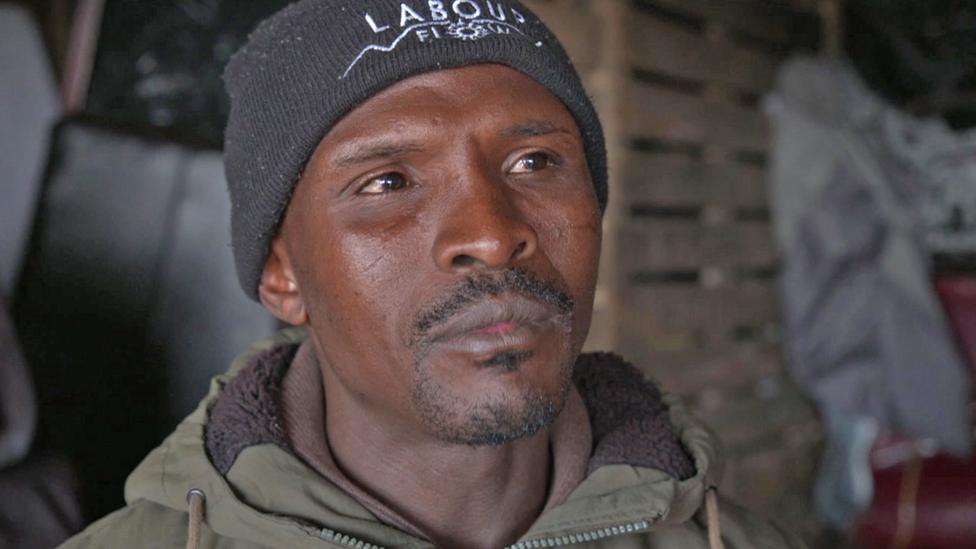
Wiseman Bambatha is waiting for the ANC to fulfil its promises
Mr Bambatha grimaces and admits his business is hanging by a thread. It is a story being replayed across the country.
In an already dysfunctional economy, with half of all young adults unemployed, load-shedding is a jobs killer.
"The government has been promising us a better life for years," says Mr Bambatha, surveying his potholed street, and a vista of corrugated shacks beyond. "Tell me, where is it?"
Khayelitsha is home to more than a million people. When night falls, and the power fails, it is enveloped in an eerie dark, punctuated by street-side braziers.
Cape Town already had the dubious distinction of being the murder capital of Africa - load-shedding and the absence of street lighting has added a new level of menace.
After sundown I meet Mr Bambatha's wife, Ruby, huddled on a sofa with her two young daughters, all of them illuminated by a flickering candle.
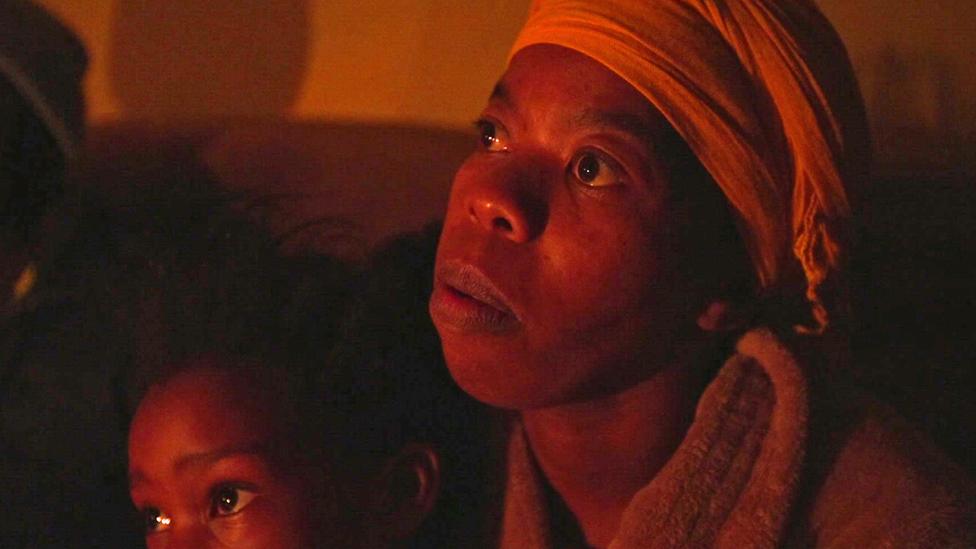
Ruby Bambatha and her children do not go out after dark
"I always try to get home before dark, get the kids inside and lock the door - only then I feel safe," she says.
And even in death, the power crisis is robbing South Africans of their dignity.
Juggling corpses
A man who runs a funeral parlour a couple of miles from Khayelitsha keeps bodies in a cold store behind his office.
"When the power is out for four hours we have a big problem," he says. "The corpses start to decompose, you can imagine the smell. This is not something grieving families can accept."
So the funeral director phones around his friends in the business. When he finds someone who has still got power and space in their cold store, he ferries his bodies to them.
Across Cape Town, corpses are being juggled every day in search of reliable power.
Load-shedding feels like the service delivery failure that could break the grip of the African National Congress (ANC) on power.
The specific reasons for the rolling blackouts are legion: obsolete coal-fired power stations; incompetent management at the state-owned energy company Eskom and rampant corruption.
But ultimately there is one stark political reality: the party of Nelson Mandela, which has monopolised power for 29 years since liberation from apartheid, owns this crisis.
Load-shedding could be our Achilles heel. It could cost us our majority"

I meet ANC Secretary-General Fikile Mbalula five minutes after power and light come back on at Luthuli House, the party's Johannesburg headquarters.
He used to revel in the nickname "Mr Fixit". No-one seems to call him that now.
"Load-shedding could be our Achilles heel," he acknowledges, with surprising candour. "It could cost us our majority."
South Africans go to the polls next year. The poll ratings of the ANC and President Cyril Ramaphosa have been on the slide for months.
The party is vulnerable as never before, but only if voters have a credible alternative.
The leader of South Africa's biggest opposition party, the Democratic Alliance (DA), is John Steenhuisen.
His Cape Town office gives clues as to the scale of his ambition. There are photos of former US President John F Kennedy everywhere.
In a further nod to his political hero, Mr Steenhuisen promises me he will put together a "moonshot coalition" of a dozen opposition parties to bring down the ANC.
But Mr Steenhuisen is white in a country where white people constitute just 7% of the population. Two-thirds of his party members are white. So too are 70% of the faces in South Africa's boardrooms.
No amount of DA talk about competence and meritocracy can mask the fact that South Africa is not a society that has left the trauma and systemic inequality of apartheid behind.
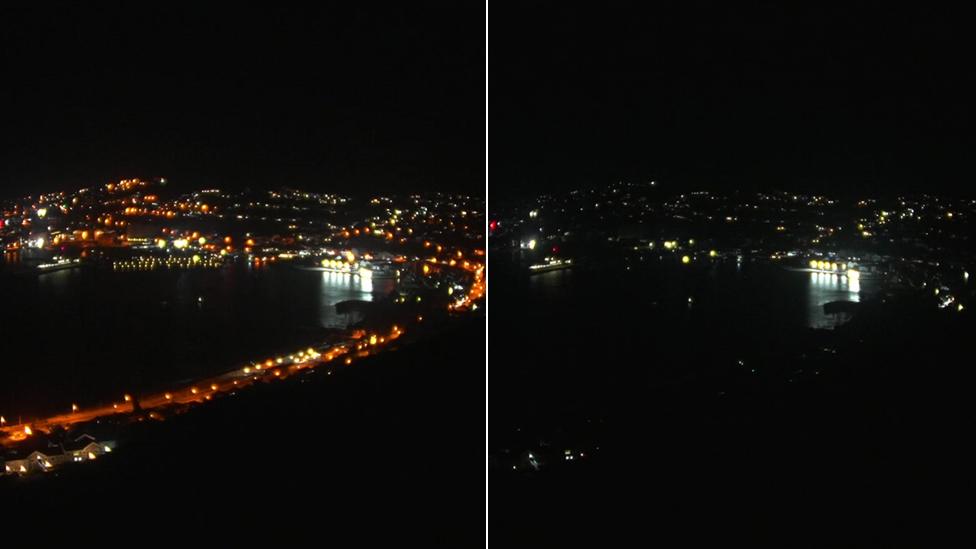
Photos of Simon's Town, near Cape Town, taken at night - with lights on (left) and during a blackout (right)
Which means that the most potent political force in the country right now may well be Julius Malema.
He was thrown out of the ANC more than a decade ago - party bigwigs told him to take anger-management classes following a slew of accusations of inciting race hate and violence.
He founded his own party, the Economic Freedom Fighters (EFF), committed to the nationalisation of land, the banks and the mines - in other words the key pillars of residual white economic power.
Mr Malema senses opportunity as the energy crisis worsens this winter.
"Let the grid collapse," he tells me. "I'm not wishing for it but it is going to happen, and then people are going to rise - I'm telling you there's going to be a revolution."
The ANC has managed, or mismanaged, South Africa for the last 29 years.
A day of reckoning is fast approaching, and it promises to be painful.
Related topics
- Published24 May 2023
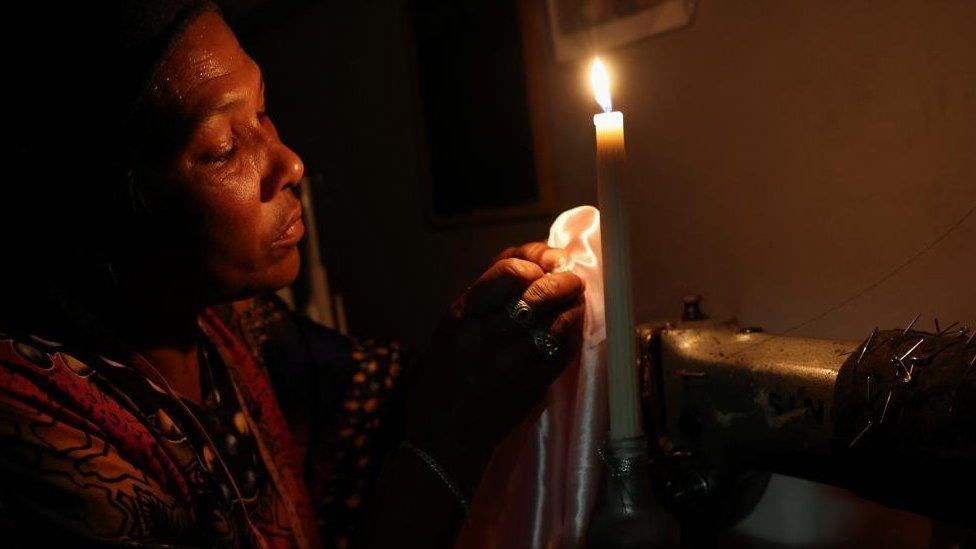
- Published6 February 2023
